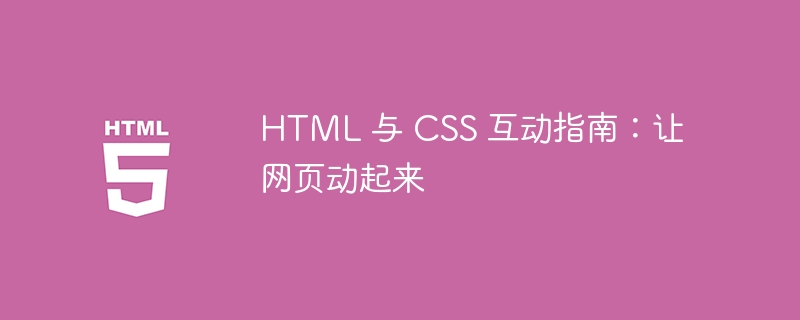Home >Web Front-end >HTML Tutorial >An interactive guide to HTML and CSS: bringing your web pages to life
An interactive guide to HTML and CSS: bringing your web pages to life
- 王林Original
- 2024-04-09 13:18:02594browse
By combining HTML elements and CSS attributes, interactive web pages can be produced. HTML elements include forms, buttons, and links, which can be used to collect user input, trigger events, and link actions. CSS properties such as interaction states, transitions, and transitions control hover, activation effects, and smoothness. Common practical examples include floating menus, switchable panels, and drag-and-drop elements, through which interactive elements can improve user experience and increase web page engagement.

Interactive Guide to HTML and CSS: Make Web Pages Move
Introduction
Interactive web pages improve user experience and increase engagement. By combining HTML with CSS, you can create dynamic and engaging web pages. This guide explores how to use HTML and CSS elements to achieve interactivity and provides practical examples.
HTML Elements
- Forms: Use forms to collect user input.
- Button: Users can click buttons to trigger events.
- Link: Trigger an action when the user hovers or clicks the link.
CSS properties
-
Interaction state: For example
:hover(triggered on hover) ,:active(triggered when activated). -
Transformation: For example
transform(move, rotate, scale). - Transition: Control the smoothness and duration of the interactive effect.
Practical case
1. Suspended menu
<nav>
<ul>
<li><a href="#">Home</a></li>
<li><a href="#">About</a></li>
</ul>
</nav>rrree2. Switchable panel
nav ul li a {
color: black;
}
nav ul li a:hover {
color: red;
text-decoration: underline;
}<div id="panel" style="display: none;"> <h1>Hello World</h1> </div>
#panel {
display: flex;
align-items: center;
justify-content: center;
background-color: yellow;
height: 200px;
}
#show-panel-button {
margin: 10px;
padding: 5px;
border: 1px solid black;
background-color: white;
cursor: pointer;
}3. Drag and drop elements
document.getElementById("show-panel-button").addEventListener("click", function() {
document.getElementById("panel").style.display = "flex";
});<div class="draggable" draggable="true"> <p>Drag me</p> </div> <div class="drop-zone"></div>
.draggable {
border: 1px dashed black;
padding: 10px;
margin: 10px;
}
.drop-zone {
border: 1px dashed blue;
padding: 10px;
margin: 10px;
}The above is the detailed content of An interactive guide to HTML and CSS: bringing your web pages to life. For more information, please follow other related articles on the PHP Chinese website!

